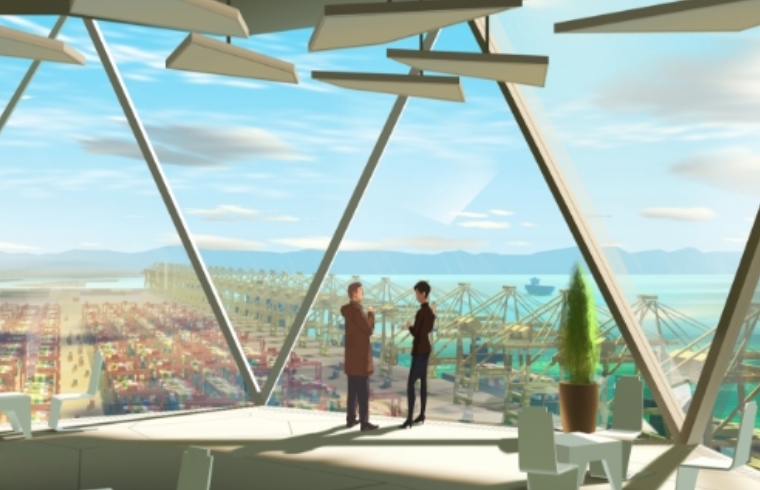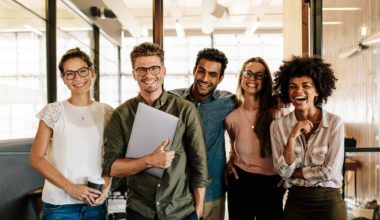Dirk: I think there’s a lot that you young guys can contribute to that topic. So, let’s start again with your smartphones and the Twitter question. Twenty years from now, will TOC still be in Rotterdam, or will Rotterdam be underwater?
While these guys decide the fate of Rotterdam, I would like to introduce another millennial, Matthew Wittemeier, my colleague right in the back. He’s not only the organizer of this session and the man who’s pulling the digital strings behind the scenes, but he’s also the co-author of a science fiction novella called 2038: A Smart Port Story. And, in this story, he predicts that in 20 years’ time, global warming will have opened up the arctic passage, and the Port of Reykjavik in Iceland will become one of the major transshipment hubs.

Incidentally, some of them have already started to become reality. Last week, DP World signed a contract with Russia to explore the possibility of terminals along the Arctic route, and the German Bremen Port signed a contract with [Finnafjod] to develop new facilities in Iceland. So, our rising sea levels – will the sea levels rise much faster than we expect? Let’s see what our millennials think.
Eslie: Yeah, being Dutch, I think there’s only one answer. Because if you look at our history, we’ve been living underwater for quite some time, and I think we will make sure Rotterdam will never be underwater.
Krzysztof: Well, just like you said, Dutch people are used to living under the level of the sea … that everyone will prevail, not only people in Rotterdam, that we will get through it … Though, it’s actually scary that, year-by-year, you don’t have to put on the news, you can just look outside the window and see how drastically the weather is changing.
Dirk: You used the word adapt, and I saw a couple of others of you used the word adapt. Is it really a matter of adapting to the situation, or do we want to do something to change it?
Jennifer: Thank you, Dirk … So, of course we are able to adapt, and we show that and prove that in history. I agree with that, but I think that’s not enough. It’s not only reacting by adapting, I think we also have the responsibility to act, and I know this is about millennials. But I don’t think it’s only about our generation. I think all the generations have to be aware of that, and maybe one specialty about the millennials is that we are more conscious about that.
Dirk: Good point. The younger generations are making headlines at the moment with “Fridays for Future.” Why don’t we see “Mondays for Millennials?” Why don’t we hear your voice?
Krzysztof: If I may add just one little thing on the pessimistic note, I just read that if the entire planet would live like Europeans, live on the same level with use of plastic, the paper, everything, just like we live, the entire planet’s resources would run out in nine months … So, I think we have to brace for winter. I don’t want to go Game of Thrones here, but I think it’s really unavoidable, and we’re not going to run away from it. And I do believe that we are behind that point where we can actually make a difference in the way that everything’s going to be back as it used to be with nature.

Elliot: So, I think we’re going to adapt, but I don’t know that we’re too far gone. Right? I mean there’s some really exciting science that’s going on right now. I don’t know if you’re familiar with Joanne Chory’s work on getting plants to actually absorb CO2 and hold it longer. If you could get plants to actually absorb just a little bit more, you could not only change things, but you could rouse the … I think we just need to spend time working on the problem. I don’t think all is lost and that we can’t come back from it.
Dirk: But our industry. Are we doing enough to prevent climate change or improve the situation? Anastassios, your thought leader was Tristan Smith. Is our industry doing enough, or is there more that the younger generation, the millennials, can do?
Anastassios: I don’t think any industries are doing enough in the parameters of what we’re discussing. I think this industry especially, when we’re talking specifically about ships and not necessarily the land side, the contribution is quite small compared to global. Other people need to do more and take more of that burden … I think that’s just the wrong philosophy because every business needs to push itself to the edge when it comes to this issue.
Eslie: I think it’s very important that as a maritime industry, we look bigger than just the ships and the ports. We need to look at the whole transport industry, and I think the transport industry is one of the biggest contributors to CO2 emissions worldwide. So, we need to make sure that we use all of our knowledge and all of our innovations and all of our products to improve the whole supply chain of products.

Audience Question: With IMO 2020 coming into effect next year, are initiatives like this likely to improve sustainability in the maritime industry?
Anastassios: Sustainability is twofold. There’s the financial and the environmental. I think environmentally, yes, this regulation is targeting specifically human health because of the implications that sulfur emissions (SO2) have. You will see small companies that are probably going to fold because of this. So, if you define sustainability as efficient, so to speak, companies remaining in the industry, then, yes, that environmentally will help. But you will also see a lot of financial pain that’s about to come in the next five years, and that is part of sustainability as well.

I think IMO 2020, in the grand scheme of things, is a small issue, but it will be a strong example, let’s say, of what happens when you just introduce environmental regulations. What happens to the industry as a whole and what could be the fallout of that? So, more sustainable, yes, but with pain to come.
Krzysztof: The maritime industry as a whole is responsible for about 3% of CO2 emissions. It equivocates to like the fifth-largest economy. Maritime will have to put up regulations out there, though, as you did mention, it’s going to go with the pain. And, one of the ideas that is floating around and associations like IMO or even ESPO or IPH, is to put some tax burden on CO2 emissions. Though, I can absolutely guarantee and bet with everyone that it will go together with an enormous backlash.
Though ideas like that are really welcomed in very highly developed countries with a very good level of living, in countries that are still struggling to get by, it’s going to be hard to tell someone in a still-developing economy, “Well, you know what? You’re not going to eat chicken three times a week. You’re going to eat it once a week. But we’re going to share the burden together. Though we made the mess, now all of us are going to clean it.”


